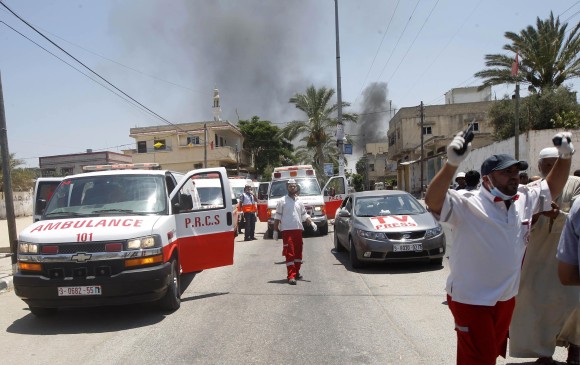31st July 2014 | Sarah Algherbawi | Gaza, Occupied Palestine
Khuza’a is a 4000 acres town that lies east of Khan Younis city in the southern area of Gaza, with a population of almost 11,000 people. On Monday night, July the 21st, Israeli forces started to bomb Khuza’a heavily, with the aim of destroying it. Before the operation started, the Israeli army ordered the residents of Khuza’a to evacuate their homes, almost 70% of the residents left their homes to UN shelters or relatives’ houses in relatively safe areas, while around 3,000 people decided not to leave.
Mahmoud Ismail, one of the eyewitnesses of the massacre, explained the reasons behind 3,000 people not leaving their homes in response to the IDF orders, saying: “Neglecting Israel’s orders of evacuating our homes was a decision that each of us has made individually, and not at all heroic! It is just that many of us did not have the emotional capacity to sleep away from home, others thought the operation would be over very fast and it wasn’t worth the effort of evacuation, while the majority like me didn’t expect, even in the worst case scenario, that we will witness the worst nightmare of our lives in the coming few hours.”
At first, a bomb cut the main road that linked Khuza’a with Khan Younis, another one then destroyed the power transformers, another damaged the mobile networks, and a fourth destroyed the landlines! Leaving Khuza’a with no electricity, Internet, mobiles, or telephones, completely disconnected.
People spent the whole night in complete darkness; they heard nothing but the noise of shelling, warplanes buzzing, and the falling glass of windows. Fragments of bombs hailing down reached everywhere. Danger surrounded every corner of the house and everybody.
Mahmoud’s mind was besieged with ideas and scenarios that would happen, just as black as the darkness around. He was counting the number of shells, foretelling where they’d fall, whose house that was bombed, is it coming to ours? Which mosque? What kind of bombs are they using? Is it tanks or F16s …? Countless questions with no answers, just the sound of bombs.
The next morning, the ICRC (after hundreds of appeals by residents to save the lives of people, evacuate the injured, and pull out the dead) told them to leave their homes to the entrance of the town to secure their exit. The trapped 3,000 people left their homes in a legion similar to their predecessors, 66 years ago. They reached the entry point with extreme difficulty, but were surprised with Israeli tanks instead of ICRC ambulances, that started to shell and shoot every moving body! People rushed back in the opposite direction; in the meantime, many were killed and injured.
Mahmoud, his family, and other people who he didn’t even know, were able to reach a house that contained 50 people, they distributed themselves into three rooms; believing that this way they might lessen the death toll.
The second night was more horrific, children were crying and screaming, they were terrified and thirsty; as the IDF bombed the town’s water tanks, leaving residents with no water to drink. While Mahmoud and many others were waiting the morning light, hoping that the light would shed some hope.
The light came up, along with a sound of a bomb that hit the shelter. What was even worse than the sound of a bomb was the silence that followed. Everything was hit, and grey is all you see. Moments after, the grey turned into RED! Mother, brother, still alive? He wondered. He checked if he still has his feet, his only way to survive.
Run, he told himself, minutes and he reached his house, once arrived, the house was hit with yet another bomb. He ran again with hundreds of people in different directions, as they came to realize the direction of shelling. On the streets they were stepping on dead bodies and injured people left to bleed. Many faces were familiar to Mahmoud, but they had no choice but to jump over bodies to save their own lives, until they were finally away from Khuza’a.
Why and how Mahmoud, his family, and a number of other families survived, he doesn’t know, its luck and nothing more than luck. They left people behind, and till this moment the actual number of martyrs in Khuza’a is unknown, the only thing Mahmoud knows for sure is that a lot of bodies are still under the rubble.

